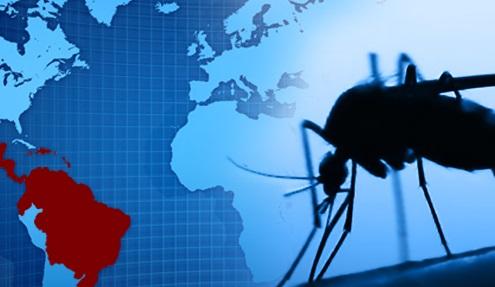
Credit: AFMC Public Affairs, US Air Force
Previous infection with dengue virus may protect children from symptomatic Zika, according to a study published January 22 in the open-access journal PLOS Medicine by Eva Harris of the University of California, Berkeley, and colleagues.
Zika virus emerged in northeast Brazil in 2015 and spread rapidly across the Americas, affecting populations that have been largely exposed to dengue virus. Because Zika and dengue viruses are closely related, it is possible that pre-existing dengue virus immunity may also impact susceptibility to Zika. But the impact of previous exposure to the dengue virus on outcomes in those infected with the Zika virus remains unclear. To study this potential impact, Harris and colleagues analyzed the large 2016 Zika epidemic in Managua, Nicaragua, focusing on a pediatric cohort with well-characterized dengue virus immune histories. The long-term, community-based cohort study, currently in its 15th consecutive year, followed approximately 3,700 children aged 2-14 years old.
The authors found that prior and recent dengue virus infection was associated with protection from symptomatic Zika virus infection in the total cohort population and among those infected with the Zika virus. By contrast, prior or recent dengue virus infection did not affect the rate of total Zika virus infection. These findings support the idea that prior dengue virus immunity might cross-protect against symptomatic Zika. According to the authors, more research is needed to address the possible immunological mechanisms of cross-protection between Zika and dengue viruses and whether dengue virus immunity also modulates severe outcomes of Zika virus infection such as neurological or congenital syndromes.
###
Peer-Reviewed / Observational Study / People
Research Article
Funding:
This study was supported by grants R01 AI099631 (AB), P01 AI106695 (EH), and U19 AI118610 (EH) from the National Institute of Allergy and Infectious Diseases of the National Institutes of Health, as well as grant VE-1 (EH) from the Pediatric Dengue Vaccine Initiative of the Bill and Melinda Gates Foundation. The funders had no role in study design, data collection and analysis, decision to publish, or preparation of the manuscript.
Competing Interests:
The authors have declared that no competing interests exist.
Citation:
Gordon A, Gresh L, Ojeda S, Katzelnick LC, Sanchez N, Mercado JC, et al. (2019) Prior dengue virus infection and risk of Zika: A pediatric cohort in Nicaragua. PLoS Med 16(1): e1002726. https:/
Image Credit: AFMC Public Affairs, U.S. Air Force
Author Affiliations:
Department of Epidemiology, School of Public Health, University of Michigan, Ann Arbor, Michigan, United States of America
Sustainable Sciences Institute, Managua, Nicaragua, 3 Division of Infectious Diseases and Vaccinology, School of Public Health, University of California, Berkeley,
Berkeley, California, United States of America
Laboratorio Nacional de Virología, Centro Nacional de Diagnóstico y Referencia, Ministry of Health, Managua, Nicaragua
Georgia State University, Atlanta, Georgia, United States of America
Health Center Sócrates Flores Vivas, Ministry of Health, Managua, Nicaragua
In your coverage please use this URL to provide access to the freely available paper: http://journals.
Media Contact
PLOS Medicine
[email protected]
Related Journal Article
http://dx.




